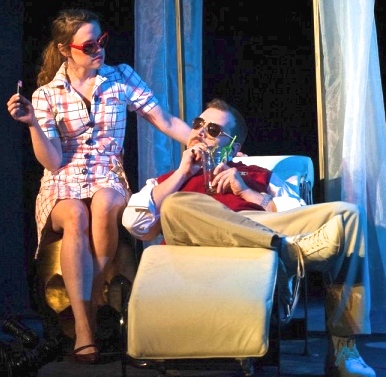 Much Ado About Nothing
Much Ado About NothingIt may be winter in Manhattan, but it looks like a long hot summer for Beatrice, Benedict, Hero, Claudio, and the gang. So hot that feral cats are a’scampering over the hot tin roofs of Sicily’s port city of Messina, the setting for Shakespeare’s Much Ado About Nothing. New York theater has been awash with Bardish productions everywhere. You can take your pick: traditional, modern dress, deconstructions, etc. Among so many offerings, I highly recommend you sashay on down to the li’l ol’ Players Theater and take a gander at their Much Ado About Nothing, rendered beautifully and hilariously in smoldering tempestuous Southern Style.
Director Christian Amato’s Messina is the modern South, and I found it endlessly fascinating to hear Shakespeare’s dialogue spoken in varying intensities of the southern drawl. Traditional readings of Shakespeare in the manner the "classic" of the British stage (John Gielgud is a prime incarnation) have their place I suppose, and if the mood strikes me they can be most satisfying. But, witnessing Mr. Amato's production, I did not have to wait for “the mood” to strike. Just about every speech delivered by the actors unveiled something new in phrases which have been spoken since this play’s first recorded production in 1612. I experienced this beautifully mounted production as a compelling auditory and visual page-turner. Mr. Amato's direction is gracious and fluid. He manages to unfold the complex plot with a delightful and pleasing clarity.
Last October, Mr. Amato's company presented a rollicking rendition of A Midsummer Night’s Dream, recreating anew the spirit of Charles Ludlum’s Ridiculous Theatrical Company. That play, with its supernatural setting and its sprites and fairies, lent itself well to such over-the-top hilarious bombast. Much Ado About Nothing lacks that supernatural element, but the humor in the current production is lustrous with a more gentle whimsy, yet is no less hilarious than Mr. Amato’s previous production. The spirited, energetic, and talented young cast moves easily in this genteel South. It bubbles under with lunacy, passion, and chicanery. (I’ll not redact the plot herein, but if readers require a full synopsis of Shakespeare’s intricate story, it would be best to refer to Wikipedia.)
The ensemble's twelve actors appear to have an authentic affinity, enjoying the kind of collective gleeful energy which more traditional renderings of Shakespeare often lack. Moreover, each member of the cast possesses focused stage presence. Not a dullard in the lot! One might say that the love/hate romance of Brianna Hurley's Beatrice and Jonathan Bethea’s Benedict are the centerpiece of the play. They are excellent actors who hold the stage alone as well as together, and they provide the occasion for fine performances by all. Charlotte Pines, as Hero in her bright yellow summer dress, is the perfect vision of the southern ingénue: Her speeches flow with mint julep and the perfume of a wronged Scarlett O'Hara. Hero is attended by Margaret (Maggie McGuire), her lady in waiting, and I can easily imagine the two of them whiling away hours fanning themselves on the veranda. Leonato, proud father of Hero -- who is also the Governor of Messina, is portrayed by Dominic Sellers with full baronial bearing. Loutish Don John, portrayed by Tyler Nye, and his cohorts Borachio and Conrade, respectively played by Evan Fazziola and Emily Madan, are very good at projecting their lower natures. Eric Fletcher as Don Pedro, along with his cohort Claudio, played by Claron Hayden, are very good as the good guys. Completing the cast are the dimwitted rustic characters: Dogberry the constable, played by Bridget Dunigen, ably assisted by the equally dimwitted Verges, played by Emily Christine.
The stage settings are simple but highly functional, and are lucidly enhanced by Rachel Sevedge's lighting and technical design. Brianna Hurley's costumes are a delight, especially the woman’s attire which channels the proper southern woman -- and what hats! And what a superb wedding gown donned by the temporarily doomed Hero! The music by Danger Mouse, Eric Fletcher, and Claron Hayden is a major asset of this production: This evocative music, with its Fender-Rhodes piano bell tones, expressively sets the various moods as it provides scene-to-scene segues. This is truly apparent in the dreamily beautiful masked ball scene, with elegant choreography provided by Emily Madan.
I am not one of those theater goers who pooh-poohs the high production values of the deep pocketed Shakespearian productions in New York. They are bankrolled to be marvelous. I suppose what I am saying, after years of seeing fine, even exquisite plays presented by small theater companies, is that the value of any production is in its ability to move the viewer beyond the humdrum of our daily grind--to allow a greater sense of human possibilities. Undoubtedly, The Theater Project and its Producing Artistic Director, Christian Amato, produce plays that embody such values.
